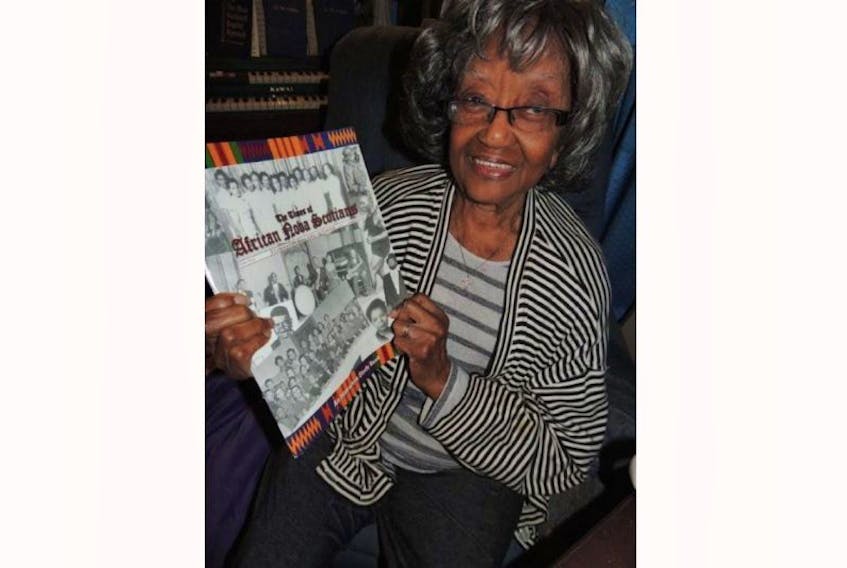Williams, who later worked more than 20 years as an editor and columnist at The News, grew up in Halifax where her family and the Davis family – Davis being Desmond’s maiden name – were close friends.
Williams, who later worked more than 20 years as an editor and columnist at The News, grew up in Halifax where her family and the Davis family – Davis being Desmond’s maiden name – were close friends.
“She was older than I. She was somebody the younger people always looked up to,” said Williams, at 93 years old.
She remembers Desmond, not for her activism, but for her strong work ethic and her constant encouragement.
“We both grew up in families that believed you could do whatever you wanted if you worked hard enough. Accomplished people like my uncle James Robinson Johnston, the first African Nova Scotian lawyer, were always pointed out to us. At the same time, I remember my father used to say, “Don’t expect to be a doctor if you don’t plan to work your way through medical school.’”
Williams describes Desmond as tiny in stature but buzzing with energy.
“She was just one of those people who was always on the move, always busy. She had a special interest in young people.”
There was a clamour in the Halifax black community after Desmond was jailed.
“I don’t remember Vi so much as people talking about what had happened to her in New Glasgow. I remember Rev. William Oliver and others being very, very upset and they took up the case.”
Desmond was among a group of community leaders who met Sunday afternoons in an “education group” with young people in a hall on Gerrish Street, now renamed Buddy Daye Street in honour of Nova Scotia’s first black sergeant at arms.
“She was there as a business person and she was an encourager, one of those who went the extra mile to convince young people to stay in school. She had her own beautician business and she also trained hairdressers. When she had a group of students graduating, she’d have quite a ceremony and I’d be asked to play the piano.”
After Williams finished business college and got a job at the Halifax dockyards, she went to Desmond every weekend to have her hair done.
“There was never any question of who was doing my hair for my wedding because I’d always gone to Vi.”
From her early days in New Glasgow, Williams, who raised seven children, was active in various organizations, usually while working full time outside the home.
“I’d been president of the girls clubs of the Y in Halifax before I came to New Glasgow, so I got involved with Mrs. (Elsie) Locke in bringing a Y to town. Once I had children in school, it was natural to be involved in the home and school association and I took on provincial positions. I was also involved in my church.”
Asked if she encountered racism in New Glasgow, arriving only a few years after the Desmond incident, she takes her time to answer.
“I just went about my business, believing my father’s words that if you accept people, they accept you. If people didn’t like me, I assumed they just didn’t like me. I never had too much trouble getting along with people.”
What does come to mind is a poignant story about her mother-in-law who lived for many years on Reservoir Street.
“I was working downtown and was used to being out and about compared to her. We’d just finished our Christmas shopping and were passing a department store when I asked her if she’d like to go in for a cup of tea. She looked at me like I was crazy.”
Williams distinctly remembers her mother-in-law saying the owners would never serve black women.
“I took her by the arm and we went in and sat down. We were served our tea like everyone else and, my goodness, how that surprised her. After that anytime we were out shopping she’d always suggest we go in for a cup of tea and I’d never say no because she enjoyed it so much.”
Williams points out society was changing in many respects by the time she joined The News.
“Women wanted to be known as Martha Jones, thank you, instead of Mrs. Frank Jones and coloured people wanted to be known as blacks, so a lot of things were changing. I was hired because to get a job done like everyone else.”
The decision to put Desmond’s face on the $10 bill delights Williams.
“The history of black people is hidden and that has to change. Recognizing Vi’s story on a national scale is a step in the right direction. We should always be aware of who paved our way as we go through life.”
Rosalie MacEachern is a Stellarton resident and freelance writer who seeks out people who work behind the scenes on hobbies or jobs that they love the most. If you have someone you think she should profile in an upcoming article, she can be reached at r.[email protected]









